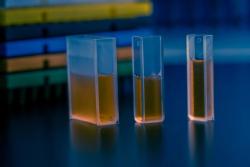
OR WAIT null SECS
- About Us
- Advertise
- Contact Us
- Editorial Info
- Editorial Advisory Board
- Do Not Sell My Personal Information
- Privacy Policy
- Terms and Conditions
© 2026 MJH Life Sciences™ , Pharmaceutical Technology - Pharma News and Development Insights. All rights reserved.
Avacta Provides Updates on COVID-19 Antigen Diagnostic Test Development
Pharmaceutical Technology's In the Lab eNewsletter
The company has provided updates on its COVID-19 tests under development with Adeptrix and Cytiva, respectively.
Avacta Group, the developer of Affimer biotherapeutics and reagents, has provided updates on its COVID-19 antigen diagnostic tests that it is developing with Adeptrix and Cytiva, respectively. With Adeptrix, a provider of analytical platforms based on bead-assisted mass spectrometry (BAMS), Avacta is developing a BAMS diagnostic test for COVID-19 infection. With Cytiva (formerly GE Healthcare Life Sciences), Avacta has developed Affimer-based rapid test strips to detect SARS-COV-2 spike protein.
Co-development with Adeptrix
The BAMS diagnostic test has reached prototype stage, Avacta announced in a June 9, 2020 press release. The assay uses Affimer reagents specific to the SARS-COV-2 virus recently developed by Avacta to capture the virus spike protein from the sample. The method breaks up the spike protein captured from the samples and is able to identify fragments of the spike protein using mass spectrometry at concentrations in the range found in patient samples generated from standard throat swabs.
The combination of the selectivity of the Affimer reagents with the precision and accuracy of mass spectrometry detection provides a high degree of specificity in the assay, Avacta stated in the press release.
The next step in the development of the final product is to evaluate and optimize the assay using patient samples at laboratory sites in the United Kingdom and United States, which will be done imminently before moving to manufacturing, clinical validation to quantify the sensitivity and specificity, and CE/FDA approval for professional use in the summer of 2020. The final product will be able to run on the installed base of mass spectrometers in clinical laboratories worldwide, according to Avacta.
“I am very pleased with the rapid progress made by our partners at Adeptrix and delighted that the Affimer reagents that we have developed to detect the SARS-COV-2 spike protein are working very well in the BAMS assay. This bodes well for all our COVID-19 antigen test development programs,” said Dr. Alastair Smith, CEO of Avacta Group, in the press release.
“A COVID-19 BAMS assay could provide highly sensitive and specific testing for up to a thousand samples per day in the hospital setting using standard equipment that is available but not currently used for coronavirus testing thus contributing significantly to an increase in global testing capacity,” Smith added.
Co-development with Cytiva
Meanwhile, the Affimer-based rapid test strips developed with Cytiva show positive initial performance data, Avacta announced in a June 24, 2020 press release. In mid-May 2020, Avacta provided Affimer reagents that are specific to the SARS-COV-2 spike protein to Cytiva, which then developed the first lateral flow test strips using these reagents and generated initial performance data using coronavirus spike protein, Avacta reported in the press release.
The data show that the test strips detect the spike protein in model samples at concentrations within the clinical range found in saliva of patients with COVID-19. Work continues to refine the test strip design, optimize its performance, and get the best detection limit possible to generate significantly high sensitivity in the final rapid test product.
Following the optimization of the lateral flow test by Cytiva, the design will then be transferred to manufacturing partners in the UK that are currently being put in place by Avacta. The company is working with these manufacturers to compress the normal manufacturing, clinical validation, and regulatory timelines to bring a product to market as quickly as possible, the company stated in its press release.
“I am delighted with the progress made by our partners at Cytiva and very encouraged by the positive data from the first test devices. We now need to optimize the test performance to achieve the best possible limit of detection as this will ultimately play a significant factor in determining the clinical sensitivity of the test,” said Smith in the press release. “This is a really positive step and we aim to have completed the optimization very soon so that we can begin the transfer to manufacturers. I will be updating the market on progress in due course.”
“I am pleased that the test development has progressed from a working initial design to now focusing on optimizing the test as much as possible. The Affimer reagents have worked well in lateral flow test strips and we are very encouraged by the initial data,” added Klaus Hochleitner, global lead, Technology Product Specialist, Cytiva, in the press release.



